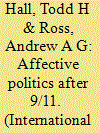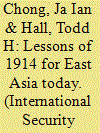|
|
|
Sort Order |
|
|
|
Items / Page
|
|
|
|
|
|
|
| Srl | Item |
| 1 |
ID:
146143


|
|
|
|
|
| Summary/Abstract |
Affect and emotion are key elements of our lived experience as human beings but currently play little role in how we theorize actorhood in international relations. We offer six amendments for integrating affective dynamics into existing conceptions of individual-level actorhood in IR. From these amendments emerge the theoretical micro-foundations upon which we build propositions concerning potential collective-level affective dynamics and political strategies. We illustrate the analytical payoff of our proposals by examining the aftermath of the terrorist attacks on 11 September 2001. By amending existing understandings of actorhood to include human affective experience, we can integrate and make sense of a variety of psychological, social, and political consequences stemming from the attacks, both within the United States and internationally.
|
|
|
|
|
|
|
|
|
|
|
|
|
|
|
|
| 2 |
ID:
134086


|
|
|
|
|
| Publication |
2014.
|
| Summary/Abstract |
The importance of World War I for understanding contemporary East Asia lies not in the ubiquitous analogy drawn between Anglo-German antagonism and contemporary U.S.-China relations, but rather in the more specific lessons the period preceding its outbreak offers concerning the sources of instability and conflict among states. More precisely, these lessons relate to the challenges posed by complex security arrangements, the dual-edged nature of nationalism, and the dangerous dynamics that can emerge during repeated crises. Appreciating how these factors contributed to mounting tensions and eventually the onset of war in Europe a century ago can enhance efforts to understand and manage tensions in East Asia today.
|
|
|
|
|
|
|
|
|
|
|
|
|
|
|
|
| 3 |
ID:
153935


|
|
|
|
|
| Summary/Abstract |
This article presents a theory of provocations. Precisely, it defines provocations as actions or incidents that state actors perceive as intentionally and wrongfully challenging or violating their values and goals, thereby eliciting outraged reactions that spur rash, aggressive responses. Outraged reactions come in three forms: personal, performative, and popular. While each form is different in nature, all work to produce strong—albeit temporary—pressures for rapid, retaliatory satisfaction. Importantly, these reactions can be mutually reinforcing and are not immune to further amplification by the actions of those with ulterior motives, political or otherwise. By laying out these dynamics, it becomes possible to understand how provocative actions can lead state actors to engage in behavior—such as France's headlong rush into defeat in the Franco–Prussian War—that would otherwise be quite puzzling.
|
|
|
|
|
|
|
|
|
|
|
|
|
|
|
|
| 4 |
ID:
152471


|
|
|
|
|
| Summary/Abstract |
Both the East and Southeast China Seas have been home to a series of repeated episodes of tension between the People’s Republic of China (PRC) and its neighbors. Much of the existing literature either treats such episodes as isolated data points or as the manifestation of underlying structural factors. In this paper, we argue that repeated tensions can have important effects on subsequent interactions, generating emergent dynamics with dangerous consequences. What is more, we believe those dynamics to already be in play in several of the disputes within East Asia today. Examining recent developments in PRC-Japan and PRC-Philippines relations, we seek to shed light on how iterated episodes of tension are shaping the trajectory of interactions in both dyads. We believe these insights can inform efforts to understand relations in the region and beyond, given the growing frequency and intensity of repeated tensions among actors.
|
|
|
|
|
|
|
|
|
|
|
|
|
|
|
|
| 5 |
ID:
109070


|
|
|
|
|
| Publication |
2011.
|
| Summary/Abstract |
What does it mean to say a state is angry? To answer this question, this paper theorizes a diplomacy of anger. Specifically, the diplomacy of anger involves a vehement and overt state-level display of anger in response to a perceived violation. Although the diplomacy of anger threatens precipitous escalation in the face of further violations, it can be ameliorated by conciliatory gestures and will subside over time absent new provocations. What is more, the diplomacy of anger can also exercise a reciprocal influence on the emotional dispositions of those that practice it. The diplomacy of anger thereby contributes to constructing particular issues as sensitive and volatile, and thus outside the realm of standard bargaining interactions. To examine the analytical purchase of this approach vis-à-vis standard accounts of coercive diplomacy, this paper looks in-depth at the 1995-96 Taiwan Straits crisis.
|
|
|
|
|
|
|
|
|
|
|
|
|
|
|
|
|
|
|
|
|